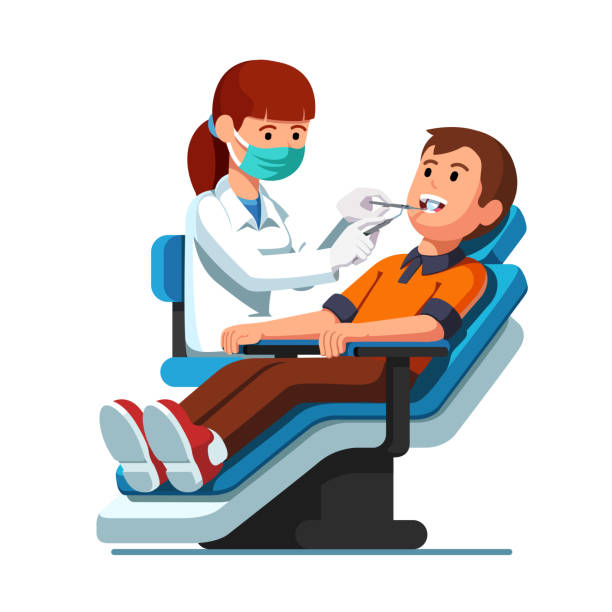Learn the Top Dentist Eugene Oregon Locals Count On for Exceptional Care
Learn the Top Dentist Eugene Oregon Locals Count On for Exceptional Care
Blog Article
Explore the Variety Of Dental Issues Dentists Commonly Take Care Of
Dental professionals are charged with attending to a wide range of oral problems, each calling for specialized expertise and strategies. From the widespread trouble of dental caries caused by bacterial task to the more insidious development of gum tissue condition, oral specialists have to be experienced at very early discovery and treatment. Tooth sensitivity, typically resulting from used enamel, includes another layer of complexity, while the very early recognition of oral cancer can be life-saving. Furthermore, misaligned attacks demand customized treatment strategies to boost both functionality and looks. What specific techniques do dental experts utilize to manage these diverse obstacles successfully?
Dental Caries and Dental Cavity
Dental caries, also understood as oral caries, are triggered by the demineralization of tooth enamel due to acid-producing microorganisms in the mouth. If left neglected, tooth cavities can lead to substantial dental issues, consisting of infections and tooth loss.
To diagnose tooth cavities and tooth degeneration, dentists employ a combination of visual exams, oral X-rays, and sometimes laser fluorescence tools. Therapy options vary depending upon the severity of the degeneration. Early-stage cavities could be managed with fluoride therapies that help remineralize the enamel. For even more advanced degeneration, a dental professional may need to eliminate the endangered cells and recover the tooth with dental fillings made from products such as composite material, amalgam, or porcelain.
Safety nets are critical in combating cavities and tooth decay. Routine dental check-ups, appropriate cleaning and flossing strategies, and a balanced diet regimen reduced in sugary foods and drinks are basic techniques that support oral health and decrease the threat of cavities.
Gum Tissue Condition

This triggers the periodontals to pull away from the teeth, creating pockets that come to be contaminated. As the body's immune system battles the germs, the bone and connective tissue that hold teeth in place are damaged down.
Dental experts detect gum tissue illness with medical examination and gum probing to determine pocket depths around the teeth. Treatment might involve scaling and root planing to get rid of tartar and germs from tooth surface areas and below the gum tissues.

Tooth Level Of Sensitivity
Beyond periodontal disease, another typical oral issue that people frequently come across is tooth level of sensitivity. Characterized by a sharp, transient discomfort in reaction to stimuli such as warm, cool, sweet, or acidic foods and beverages, tooth level of sensitivity can dramatically impact a person's lifestyle - eugene dentist. This condition usually arises when the protective enamel layer of the teeth becomes used down or when the gums decline, exposing the underlying dentin. Dentin includes tiny tubules that attach to the nerve closings within the tooth, thereby transmitting the unpleasant feelings.
Additionally, dental treatments, cracked teeth, and gum tissue illness can expose the dentin. To reduce tooth level of sensitivity, dentists might recommend making use of toothpaste created for sensitive teeth, fluoride therapies to strengthen enamel, or oral bonding to cover exposed dentin.
Eventually, addressing tooth level of sensitivity calls for an extensive approach that includes both precautionary actions and targeted therapies to reduce pain and safeguard the oral frameworks.
Dental Cancer
Dental cancer, a severe and potentially lethal problem, typically flies under the radar in regular dental treatment discussions. This sort of cancer cells can impact any type of component of the oral dental caries, including the lips, tongue, cheeks, flooring of the mouth, soft and tough tastes buds, sinuses, and throat. Early detection is crucial for website link successful treatment, yet lots of instances are diagnosed at advanced stages because of refined first signs and symptoms.
Misaligned Bites
Misaligned bites, likewise known as malocclusions, are a typical oral problem that can considerably influence both oral health and wellness and total quality of life - eugene dentist. These conditions occur when the upper and lower teeth do not line up effectively, leading to problems in biting, eating, and even talking. Malocclusions can be classified into different types, including overbites, underbites, crossbites, and open bites, each offering one-of-a-kind difficulties that need customized therapy approaches
The causes of misaligned attacks vary and can include genetic elements, early loss of main teeth, thumb sucking, and injuries to the jaw. Symptoms typically include discomfort or discomfort in the jaw, constant biting of the inner cheeks, and an increased risk of dental cavity and periodontal disease due to difficulty in preserving dental visite site health.
Orthodontists and dental practitioners utilize a variety of interventions to deal with misaligned bites, from clear aligners and standard braces to much more advanced surgeries in severe situations. Early diagnosis and treatment are essential to avoid problems such as temporomandibular joint (TMJ) conditions and irregular wear on teeth. Through detailed examination and customized therapy strategies, oral experts play a critical role in dealing with malocclusions and improving clients' dental function and aesthetics.
Verdict
Dental professionals attend to a spectrum of dental concerns, each with distinctive challenges and therapy methods. Dental caries and tooth degeneration result from microbial task that compromises tooth enamel, while periodontal condition can escalate from gingivitis to extreme gum problems. Tooth level of sensitivity involves pain from thermal stimulations, requiring specific treatment. Early detection of dental cancer is critical for effective intervention. Misaligned attacks impact both dental health and lifestyle, frequently calling for orthodontic or surgical solutions to remedy.
To detect cavities and tooth degeneration, dentists utilize a mix of aesthetic examinations, dental X-rays, and sometimes laser fluorescence gadgets.Beyond gum condition, one more usual oral issue that people often experience is tooth level of sensitivity. In addition, oral procedures, broken teeth, and periodontal condition can reveal the dentin. To minimize tooth level of sensitivity, dental professionals might suggest making use of tooth paste created for delicate teeth, fluoride therapies to reinforce enamel, or oral bonding to cover revealed dentin. Tooth cavities and tooth degeneration result from microbial task that compromises tooth enamel, while gum disease can escalate from gingivitis to additional reading serious periodontal conditions.
Report this page